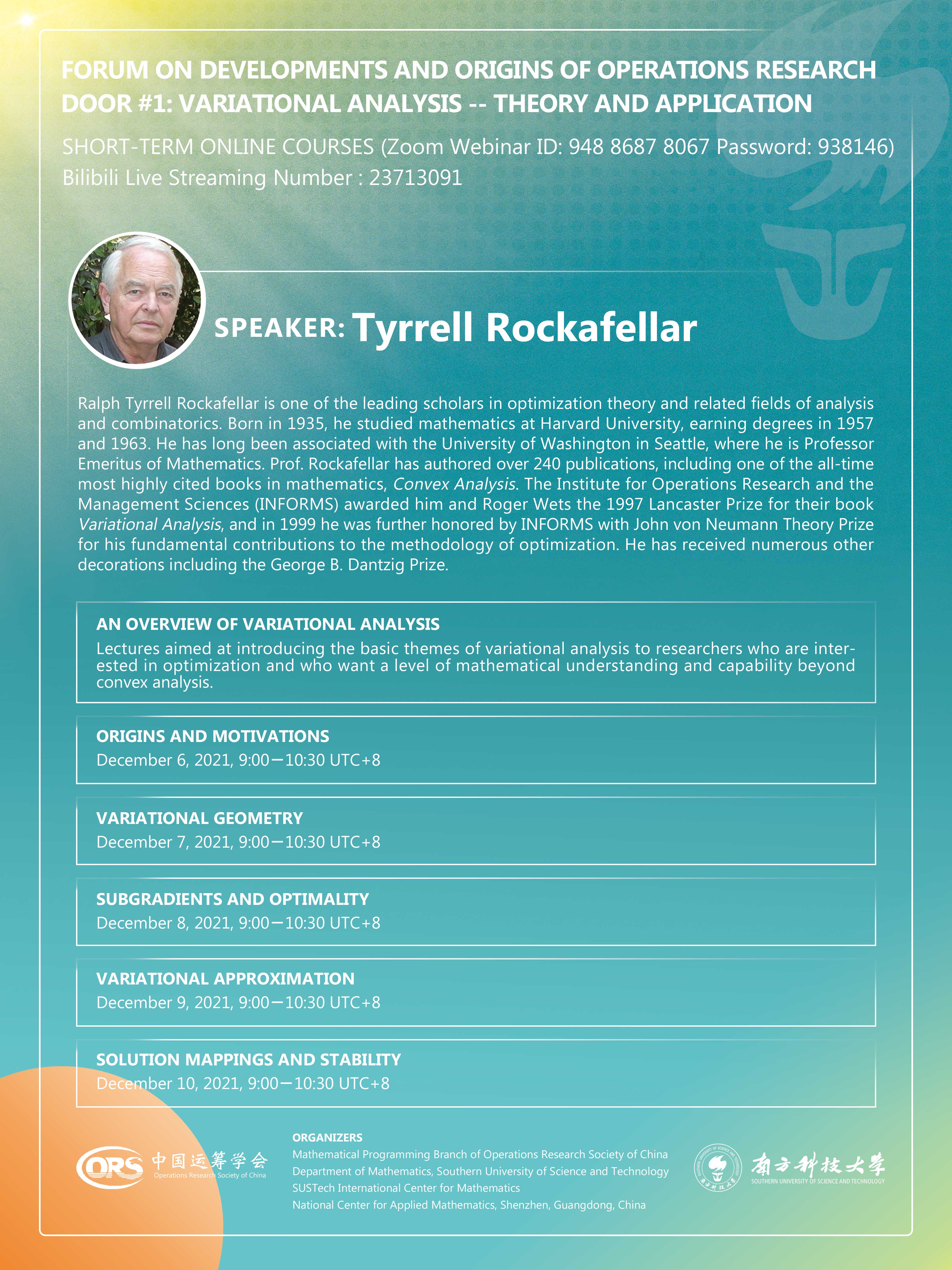Forum on Developments and Origins of Operations Research
Variational Analysis -- Theory and Application (short-term online courses) Feb 11-Dec 10, 2021
Topic VI (12.06 -- 12.10)
Speaker: Tyrrell Rockafellar (University of Washington)
Ralph Tyrrell Rockafellar is one of the leading scholars in optimization theory and related fields of analysis and combinatorics. Born in 1935, he studied mathematics at Harvard University, earning degrees in 1957 and 1963. He has long been associated with the University of Washington in Seattle, where he is Professor Emeritus of Mathematics. Prof. Rockafellar has authored over 240 publications, including one of the all-time most highly cited books in mathematics, Convex Analysis. The Institute for Operations Research and the Management Sciences (INFORMS) awarded him and Roger Wets the 1997 Lancaster Prize for their book Variational Analysis, and in 1999 he was further honored by INFORMS with John von Neumann Theory Prize for his fundamental contributions to the methodology of optimization. He has received numerous other decorations including the George B. Dantzig Prize.
Materials
SOLUTION MAPPINGS AND STABILITY
Recordings (in Bilibili)
https://space.bilibili.com/1254993141
Recordings (in YouTube)
Origins and Motivations: https://youtu.be/p8180nRJQxU
Variational Geometry: https://youtu.be/_IbLxp8SLsY
Subgradients and Optimality: https://youtu.be/JQTrFio-uKk
Variational Approximation: https://youtu.be/hIE0b_6M5dI
Solution Mappings and Stability: https://youtu.be/w1lNcLRx5no
Recordings (on professor's homepage)
Topic: AN OVERVIEW OF VARIATIONAL ANALYSIS
Lectures aimed at introducing the basic themes of variational analysis to researchers who are interested in optimization and who want a level of mathematical understanding and capability beyond convex analysis.
Origins and Motivations
December 6, 2021, 9:00--10:30 UTC+8
Why and how variational analysis developed from historical subjects such as nonlinear programming and the calculus of variations, while departing in major ways from the framework of classical analysis.
Variational Geometry
December 7, 2021, 9:00--10:30 UTC+8
The tangent and normal subpaces associated with classical geometry of curves and surfaces need to be replaced by one-sided cones of tangent vectors and normal vectors, each of two different kinds. Polarity relations underlie a concept of variational regularity.
Subgradients and Optimality
December 8, 2021, 9:00--10:30 UTC+8
The subgradients of convex analysis can be extended with localizing adjustments to nonconvex analysis in a manner compatible with traditional gradients. This amounts to applying variational geometry to epigraphs. It leads to a nonsmooth calculus that supports optimality conditions.
Variational Approximation
December 9, 2021, 9:00--10:30 UTC+8
When can one problem of optimization be said to be a close approximation of another? This is a key question for which the answer should imply closeness of optimal values and solutions, but classical concepts of analysis miss the target.
Solution Mappings and Stability
December 10, 2021, 9:00--10:30 UTC+8
When a problem is described by an equation with parameters, the standard implicit function theorem describes how the solution depends on those parameters. Problems of optimization are not modeled simply by equations, so more is needed for understanding such dependence, which relates to error analysis.
